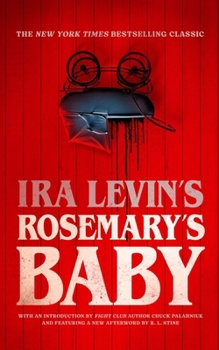Rosemary's Baby
(Part of the Rosemary's Baby (#1) Series and Βιβλιοθήκη του Τρόμου (#27) Series)
Select Format
Select Condition 
Book Overview
The genre-defining classic that ushered in the era of modern horror
One of the best-selling books of all time, Rosemary's Baby is a foundational work of suspense and psychological horror which remains as powerful and chilling as the day it was written. Hailed by Truman Capote as a "darkly brilliant tale" and adapted with near-total fidelity into the monumental film starring Mia Farrow and John Cassavetes, Ira Levin's Rosemary's Baby ushered in the era of contemporary horror as we know it, opening the floodgates to later works such as The Exorcist and The Omen. Levin ingeniously fused gothic literary tradition with modern-day New York, creating an enduring classic which the New York Times placed on its recent list of "The 25 Most Significant New York City Novels From the Last 100 Years."
Rosemary Woodhouse and her struggling-actor husband Guy are thrilled to move into the Bramford, a sought-after Manhattan apartment building prized for its Victorian details and gargoyled facade. Yet as they learn of a darker side to the building's history--and become acquainted with their overly attentive neighbors, the Castevets--unspoken tensions enter into the young couples' relationship. Matters improve when Guy lands a major role, and Rosemary at last becomes pregnant. But as her pregnancy takes frightening turns, Rosemary begins to question if her neighbors' heightened interest is strictly innocent, or if their motivations--and those of Guy himself--portend terrifying consequences for her, and her unborn child. Is Rosemary "...going mad, or going sane"?
Foreword by Chuck Palahniuk.
Customer Reviews
4 stars
Rosemary's Baby, invert good shape and fast delivery
Great Condition!
If you like the movie..
A Spooky Shocker Classic
Extremely well-crafted thriller
Masterpiece - Plain and Simple
Rosemary's Baby Mentions in Our Blog

It's always fun to see how good books get adapted for the screen. But sometimes, this happens before we've had the chance to read the source material. Or maybe we just want to reread the book before we watch. Here are thirteen of the books behind the buzziest book-to-screen adaptations.

Adapting literary horror to the screen is tricky. Sometimes it means staying faithful to the original text. But sometimes the director must take some liberties with the source material. Here are eleven of our favorite book-to-screen horror adaptations.






